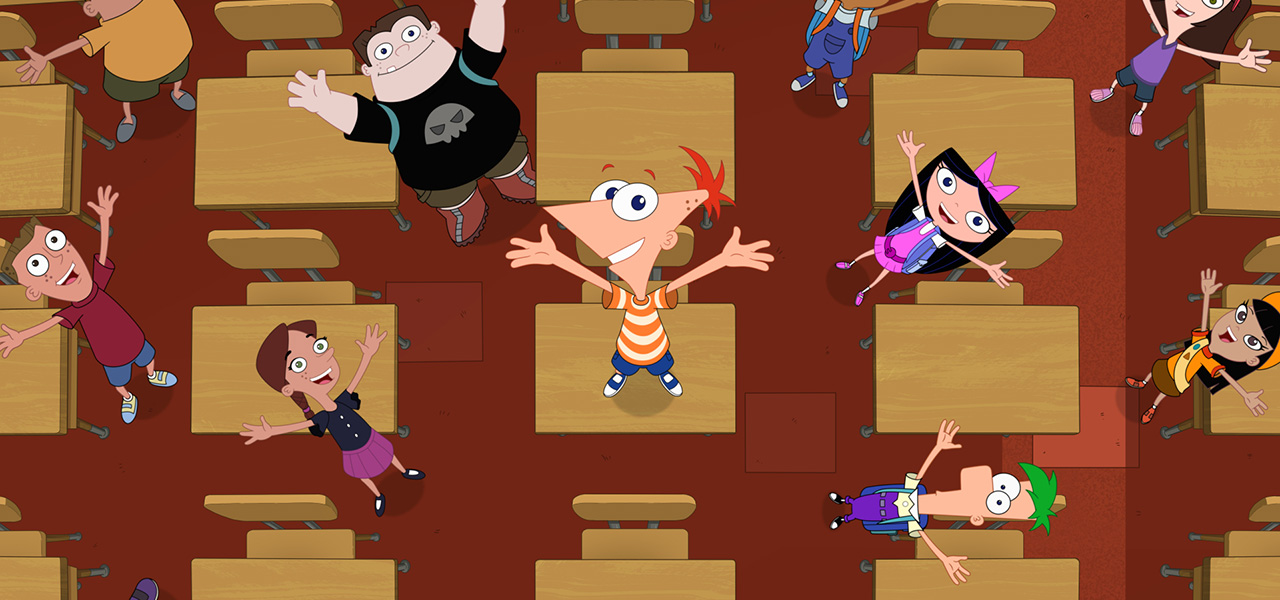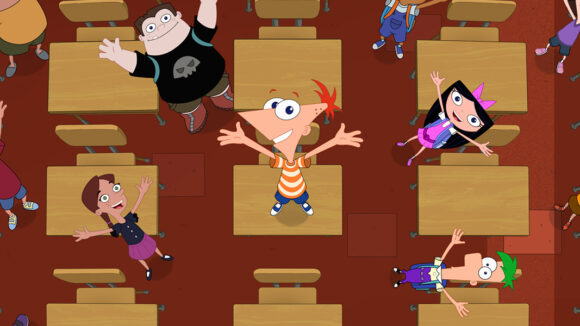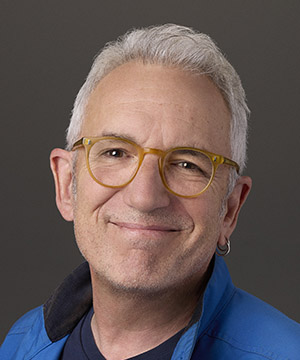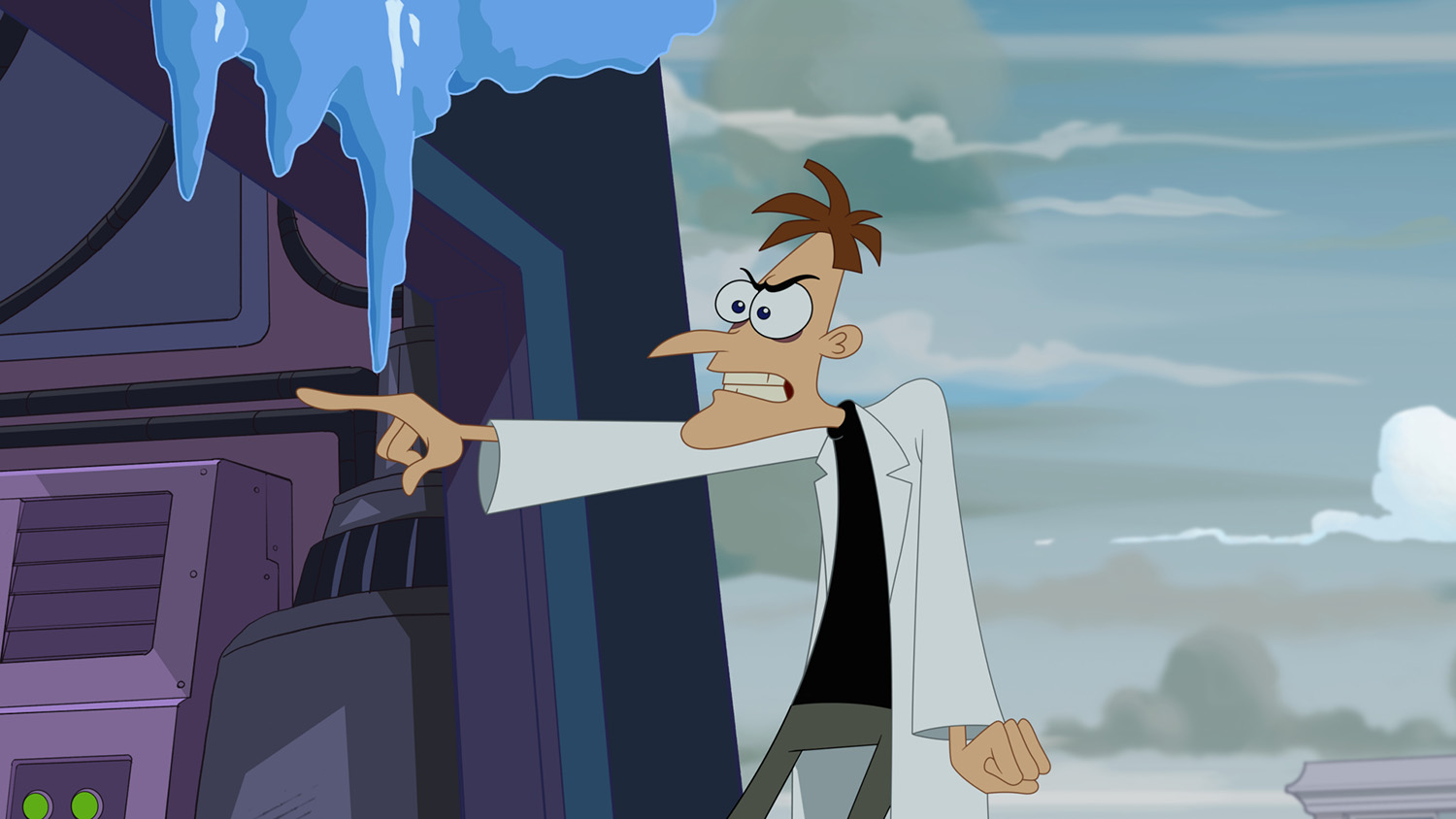

‘Phineas And Ferb’ Creators Talk About Launching New Season In A Tiktok-Fueled Era
Like many enduring cultural icons, Phineas and Ferb only seemed to grow bigger after it ended. That said, tv shows can be reincarnated. After a decade-long hiatus, creators Jeff “Swampy” Marsh and Dan Povenmire are “getting the band back together” with fresh inventions and more joyful chaos this summer.
A stepbrother duo, tattle-tale sister, and secret agent platypus return with new ways to spend summer vacation. This decision wasn’t made based just on Disney+ strategy (old episodes of the series have been streamed over 650 million hours on the streamer), but from audience passion, pandemic comfort viewing, and social media virality. Despite all the big cultural shifts of the last decade, Phineas and Ferb isn’t just aiming to stay relevant — it’s here to reintroduce kind chaos in a loud, cynical world. That approach resonates especially well in today’s Tiktok-fueled culture; Phineas and Ferb, in fact, found renewed popularity on Tiktok without ever trying — teens today repurposed the show’s jokes into memes, choreographed dances to old songs, andd helped turn co-creator Dan Povenmire into a viral figure.
In the new upcoming season, the creators of Phineas and Ferb have continued to follow their own path and not bow to current trends. The show’s refusal to rely on meanness, shock value, or adult humor makes it stand out in a tv landscape where most shows lean heavily on snark. Its smart, surreal tone, paired with emotionally grounded characters and original music, help to create a sense of warmth and irreverence that still feels ahead of its time.
Creators Marsh and Povenmire recently spoke with Cartoon Brew about returning to the show after a decade, the impact of Tiktok, and why they believe the show continues to resonate with viewers. The new season begins June 5 on Disney Channel and Disney XD, while the first batch of 10 episodes (in a 40-episode order from Disney Television Animation) will become available for streaming on Disney+ the following day.
Cartoon Brew: Walk us through the creative process. Where does your creative process start in terms of ideas?

Dan Povenmire: Once you start writing every day like we do, you start realizing that it’s not a giant vat of ideas that you can come to the end of. Ideas are not a finite object that you have. It’s like flexing a muscle, and the more you flex that muscle, the easier that muscle is to flex and the more you can live with that muscle — and so ideas beget ideas, which beget ideas, which beget ideas.
Jeff Marsh: And we really try to make sure that everybody has the option to put their ideas forward, because over the years, we’ve gotten some brilliant ideas from folks that weren’t even on our writing staff. And there’s always lists floating around.
Povenmire: That whole first run, we had a list of things that Phineas and Ferb could do and a list of “-inators,” and most of the time we didn’t even go to that list because we’d come up with new stuff. But every once in a while, when something wasn’t working, we’d erase what Phineas and Ferb were doing and start from a different angle — like, “If Phineas and Ferb did this, what’s the funniest, stupidest way it could get erased? What if it just got up and danced away?”
Tell me about a surprising moment that changed the way you viewed your work or reminded you of the show’s reach?
Povenmire: When we announced the show was ending, I was waiting for jury duty and the PR people said the announcement had gone out, so I could tweet something. And so I did a thing, you know, a quick “thank you” to the fans, and then I went to look and see if anybody had reacted to it yet. And there were literally pages and pages of people who had these stories about how that show had gotten them through chemo with their child, that it had gotten them through their parents’ divorce or the death of their sibling. There were all these things where people had been through dark times. Look, now we’re both crying.

Marsh: It touched people with their family who said, “That’s now the way we communicate. That’s our little inside jokes and inside stories, and we sing the songs.” And you realize it was something that connected family members from all different generations and inspired people. We’ve had so many people that have reached out to us on social media saying, “I’m just graduating from college with a doctorate in engineering, and it was your guys’ show that made me want to do that.”

How has the show’s virality on Tiktok impacted the way you’ve approached the new episodes?
Povenmire: What TikTok did is make me realize that there was still a huge audience out there for it. You do a show and it ends, and then you go do other shows and there’s not really a way of realizing that it’s still a big, important part of their childhood. If I was ever depressed, I would just search up one of our songs and look at the hundreds of thousands of people doing videos of “Busted” or of “Squirrels in my Pants,” and there was a whole dance trend to “There’s a Platypus Controlling Me.” Swampy and I were both performers when we were younger, both playing in bands. I did a lot of dinner theater and local theater and I just always love that response you get from the audience and that’s what Tiktok does.
To push further on that, in this Tiktok era, why do you think Phineas and Ferb’s original formula will resonate with today’s viewers?
Povenmire: We felt like we made a lot of decisions early on that we really only made because nobody else was making those decisions — decisions from the niceness of the show. All the other shows were getting most of their humor from somebody being mean or somebody being shocking or somebody being an idiot, and we felt like, What if we don’t have our show just be jerks and idiots? What if Phineas and Ferb are never trying to get away with something — they’re just going about their business, and Candace isn’t trying to hurt them. She’s just trying to go for fairness — she thinks, “Mom should see what they’re doing, because if I was doing it, I would get in trouble. So they should get in trouble for this.”
And even Doofenshmirtz is trying to better his standing because of all these horrible things that happened in his childhood. So he’s really just looking for attention and trying to feel better about himself — he’s not really trying to hurt anybody either. You know, if he actually injured Perry the Platypus, he would feel horrible. Those little subtleties, I think helped the show be what it is.

Swampy: And with kids’ shows, in particular, all parents were the enemy. And I thought we could do better because our parents weren’t jerks and idiots, for the most part.
How does it feel knowing that you educated an entire generation about the aglet?
Marsh: We’ve ruined a joke forever. It’s incredible. You used to be able to ask, “What’s the tip of the shoelace?” And nobody knew. Now, everybody knows.
Povenmire: I think it was me that pitched that story idea because Swampy and I were talking, and I just happened to know what an aglet was, because I have useless information. And I was like, “Oh, you know what we should do? We should have Phineas and Ferb raise aglet awareness for an episode.” Everybody sort of laughed, and then I went on and I said, “No, no — I’m serious. Let’s figure out how to do that. If we do this right, we will have, for the first time in the history of the world, an entire generation of people who know what an aglet is.”
And there is — right now, as we speak — an entire generation of kids who are in their 20s and all know what an aglet is. If you ask that question at a tv trivia night and there’s anybody from that generation there, they’re going to get it off the bat. And that’s very cool. There’s actually a couple of things we’ve done that made a big dent in pop culture, but maybe the strangest thing that we’ve ever done is color Perry the Platypus teal. And then in 2020, scientists figured out that if you put an ultraviolet light on a platypus, it glows teal, exactly the same color as Perry the Platypus. That made me think, “Wait, am I in The Truman Show?”
If you had to invent a new “inator” for modern problems in the real world, what would it be?
Marsh: A “Kindness-inator.”
Povenmire: An “empathy-inator,” because I think that too much of society has become so factionalized that they think [other] people are the enemy to these people when, really, we’re all very much the same, and if we got in the same room, you would find that everybody’s just normal people trying to make the best of their life. And I think that’s what we need a lot more of right now — empathy.

.png)